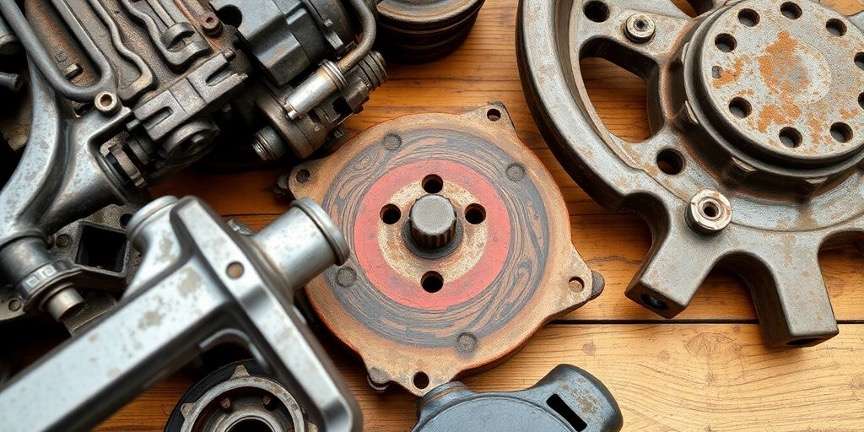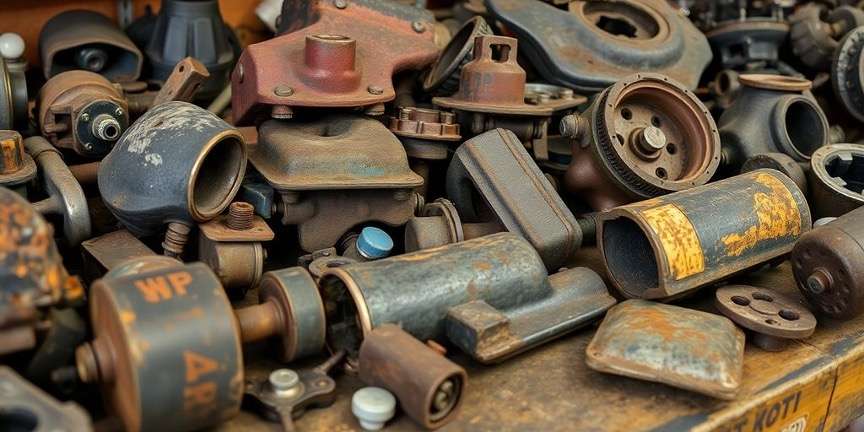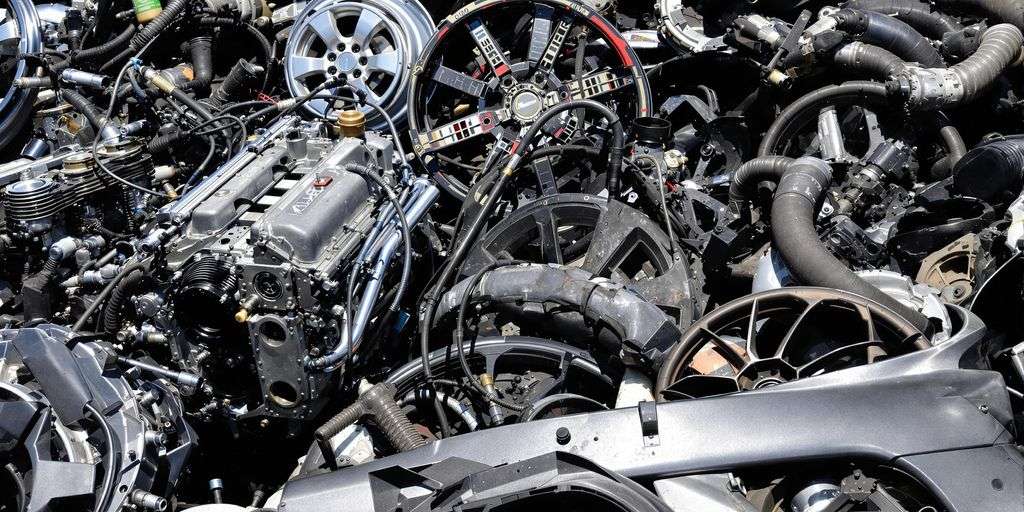Key Takeaways
- Understand what factors affect your junk car's value, like age, condition, and demand for parts.
- Evaluate the condition of your car's parts to see which ones are still in good shape and worth selling.
- Research current market trends to know what parts are in demand and where to sell them.
- Calculate the scrap metal value of your car to ensure you get a fair price for its weight in metal.
- Explore different selling options, such as junkyards, online platforms, or direct sales to enthusiasts.
Understanding the Basics of Junk Car Valuation

Factors Influencing Junk Car Value
When it comes to figuring out what your junk car is worth, there are a bunch of things to consider. First off, the car's age and condition play a huge role. If it's a newer model or has parts in decent shape, you're looking at more value. On the flip side, older cars, especially those that are rusted out or missing key components, might not fetch as much.
Another big factor is location. Where you are can influence how much you get for your junk car. If you're near a scrap yard or a place that buys salvage cars, you might get a better deal simply because of lower transportation costs. Plus, some car models are more popular in certain areas, which can drive up their value.
And let's not forget about market demand. Some parts, like electronics or hybrid batteries, are in high demand and can significantly boost the car's overall worth. Always check what's hot in the market before making a decision.
Importance of Accurate Valuation
Getting the right value for your junk car isn't just about making a quick buck; it's about ensuring you don't get shortchanged. Knowing the true worth of your vehicle can help you negotiate better deals, whether you're selling it whole or parting it out. An accurate valuation ensures you maximize your return, turning what seems like a heap of metal into a potential cash cow.
Common Misconceptions About Junk Car Worth
There's a lot of misinformation out there about junk cars. Some folks think just because a car doesn't run, it's worthless. But that's far from the truth. Even non-running vehicles have parts that can be sold or scrapped for a decent price.
Another misconception is that all junk cars are valued the same. In reality, each car is unique, and its value can vary widely based on its make, model, and condition. Lastly, some people believe that selling a junk car is a hassle, but with the right approach, it can be a straightforward process.
Remember, every junk car has potential value. It's all about understanding what you have and knowing where to look for buyers. With a little research and effort, you can turn an old clunker into something worthwhile.
Evaluating the Condition of Your Junk Car
Identifying Valuable Parts
When you're dealing with a junk car, the first thing to do is figure out which parts might still be worth something. Some parts can fetch a decent price, even if the car as a whole isn't worth much. Focus on components like the engine, transmission, and catalytic converter. These are often in demand and can be sold separately. Even minor parts like mirrors, windows, and seats can be worth looking into. If you're not sure about the value of specific parts, a quick search online or a chat with a local mechanic can give you a better idea.
Assessing Wear and Tear
Next, take a good look at the overall condition of your car. Check for obvious signs of damage like rust, dents, and scratches. Don't forget to look under the hood—inspect the engine and transmission for any issues. If the car has been sitting for a while, you might find more wear and tear than expected. Keep in mind that the more wear and tear, the less you can expect to get for the parts. It's a good idea to take notes or even photos to document the condition, which can help when you're negotiating with potential buyers.
Determining Repair Costs
Once you've got a handle on the condition, think about what it would cost to fix it up. Sometimes, the cost of repairs can outweigh the value of the car itself. Calculate how much it would take to get the car running again, if that's even possible. This includes parts, labor, and any other expenses. If the numbers don't add up, it might be better to sell the car for parts or scrap. Knowing these costs can also help you set a fair price if you decide to sell the car as is.
Taking the time to thoroughly evaluate your junk car can make a big difference in how much you ultimately get for it. Don't rush the process—knowing exactly what you're dealing with is key to maximizing your returns.
For more insights on how to assess the value of your junk car, you might want to discover how junkyards determine the value of old vehicles. Understanding these factors can give you a better idea of what to expect when selling or parting out your car.
Researching Market Trends for Junk Car Parts

Analyzing Local Demand
When you’re looking to sell parts from your junk car, understanding local demand is crucial. Start by checking out local junkyards and repair shops to see what they’re buying. Junkyards are often on the hunt for specific parts, especially those that are hard to find or in high demand. Take note of what’s popular in your area. For example, if hybrid cars are common, there might be a higher demand for hybrid batteries or electronic components.
Comparing Online and Offline Markets
Both online and offline markets have their pros and cons. Selling online gives you access to a broader audience, but it also means you’re up against more competition. Platforms like eBay or Craigslist can be useful, but you'll need to ensure your parts are listed correctly and competitively priced. Offline, you might get faster sales by dealing directly with local buyers who need parts immediately. Consider the cost of shipping and the time it takes to manage online listings versus the ease of local transactions.
Identifying High-Demand Parts
Not all parts are created equal in the resale market. Some parts, like engines and transmissions, often fetch higher prices due to their necessity and complexity. On the other hand, items like mirrors or hubcaps might not be as lucrative. Research which parts from your car model are most sought after. A good way to do this is by browsing forums and communities dedicated to your car type or by checking recent sales data on platforms.
Understanding which parts are in high demand can significantly boost your profits. By focusing on these, you can maximize the return on your junk car.
In conclusion, by researching market trends and understanding what’s in demand, you can effectively assess and capitalize on the value of your junk car parts. Whether you choose to sell locally or online, being informed will help you make the most of your sale.
Calculating the Scrap Metal Value of Your Car
Understanding Scrap Metal Prices
Getting a grip on scrap metal prices is the first step in figuring out how much your junk car is worth. These prices can swing wildly based on global demand, economic conditions, and supply issues. Typically, the main metals in cars—steel and aluminum—set the base scrap value. Right now, scrap car prices vary from $145 to $195 per ton. Knowing these rates gives you a baseline for your car's value.
Estimating Weight and Material Value
To get a rough idea of your car's scrap value, you'll need to estimate its weight and the materials it's made of. Cars are mostly steel, but they also have aluminum and other metals. Weigh your car or check its manual for weight details, then multiply by the current scrap price per ton. This simple calculation can give you a ballpark figure to work with.
Impact of Market Fluctuations on Scrap Value
Scrap metal prices don't stay the same—they're affected by global market trends. When demand for metal is high, prices go up, and vice versa. Keep an eye on market trends to sell at the right time. Even small shifts can mean the difference between a good deal and a great one.
The value of scrap metal is like a roller coaster—always moving up and down. Understanding when to sell is key to maximizing what you get from your junk car.
Maximizing the Sale of Junk Car Parts
Preparing Parts for Sale
Selling parts from your junk car can be a smart way to make some extra cash. First impressions count, so make sure each part is clean and looks its best. Dirt and grime can turn off potential buyers, so a little elbow grease goes a long way. Know exactly what you're selling by identifying the make, model, and year of the vehicle the part came from. This info is crucial when talking to buyers or listing online. Lastly, be upfront about the condition. If something's not working, say so—honesty builds trust and can lead to repeat business.
Negotiating with Buyers
Negotiation is a skill, and when you're selling car parts, it can make a big difference in your profits. Start by researching what similar parts are selling for in your area and online. This gives you a baseline to work from. Don't be afraid to haggle a bit; buyers often expect it. Keep your cool and be prepared to walk away if the deal doesn't feel right. Sometimes, it's worth holding out for a better offer, especially if you're dealing with parts in high demand.
Utilizing Online Platforms for Selling Parts
The internet is your friend when it comes to selling junk car parts. Platforms like eBay, Craigslist, or specialized car forums can connect you with buyers who need exactly what you're offering. Take clear, detailed photos of each part and write honest descriptions. Highlight any unique features or benefits. Shipping can be a hassle, so make sure to account for it in your pricing. And remember, the more places you list your parts, the better your chances of finding a buyer quickly.
Selling parts from your junk car can be a great way to earn money, but it takes a bit of effort and know-how. Clean your parts, know their worth, and use online platforms to reach a wider audience. With the right approach, you can turn those old car parts into cash.
Navigating Legal and Documentation Requirements
Importance of Proper Paperwork
When selling your junk car, having all the necessary paperwork in order is key. A clear title is your golden ticket to a smooth transaction. It proves you're the rightful owner and have the authority to sell. If your car's title is missing, don't panic just yet. You can still sell your car, but it might involve a bit more legwork, like obtaining a duplicate title from the DMV.
Selling Without a Title
It sounds tricky, but selling a junk car without a title is possible. Some states allow it, but you'll need to prove ownership in other ways, like through a bill of sale or old registration documents. Check your local regulations first. If you're planning to sell your old junk car to a junkyard, they might have specific requirements or be able to guide you through the process.
Understanding Salvage Certificates
A salvage certificate is different from a title. It's issued when a car is deemed a total loss by an insurance company. If your junk car has a salvage certificate, it can still be sold, but the buyer will know it's been in a major accident or is otherwise heavily damaged. This could affect the price, but it's a legal requirement to disclose it.
Exploring Alternative Selling Options for Junk Cars
Selling to Junkyards
Selling your junk car to a junkyard is one of the most straightforward options. Junkyards often offer cash on the spot and handle the paperwork, making the process quick and easy. They typically dismantle the vehicle and sell the parts individually, which can be profitable for them. When considering this option, it's wise to get quotes from multiple junkyards to ensure you're getting the best deal. Don't forget to factor in transportation costs if the junkyard doesn't offer free towing services.
Direct Sales to Enthusiasts
If your junk car has parts that are rare or in demand, selling directly to car enthusiasts might be a good option. These buyers are often looking for specific parts for restoration projects. To reach this audience, you can use online forums, social media groups, or local car clubs. Be prepared to negotiate prices, as enthusiasts may have a keen eye for detail and value. This route might take more time and effort, but it can sometimes yield higher returns than selling to a junkyard.
Using Car Removal Services
Car removal services offer a hassle-free way to sell your junk car. They typically handle everything from towing to paperwork, and you can often get a quote over the phone or online. These services are convenient, especially if your car is not in running condition. Some companies even offer same-day pickup and payment, providing a quick solution to get rid of your vehicle. When choosing a service, compare offers to ensure you're getting a fair price.
Selling a junk car doesn't have to be a daunting task. By exploring different avenues, you can find the best option that suits your needs and maximizes your return. Whether it's through a top junk car buyer like Peddle, Carvana, or Copart, or a local enthusiast, there's a market out there for your vehicle.
Conclusion
So, there you have it! Figuring out what your junk car is worth isn't as tricky as it seems. Just remember to check out the condition of the parts, see what the market's like, and don't forget about those scrap metal prices. Whether you're selling or buying, knowing these details can really help you get a fair deal. And hey, always be upfront about the car's condition. It might seem like a lot, but once you get the hang of it, you'll be wheeling and dealing like a pro. Good luck!
Frequently Asked Questions
What is a junk car?
A junk car is a vehicle that’s no longer safe to drive or too costly to repair. It might still have parts that are useful or can be sold for scrap metal.
How do I find out the value of my junk car?
You can find out the value by checking the condition of its parts, looking at current scrap metal prices, and comparing offers from junkyards.
Can I sell my junk car without a title?
Yes, you can sell a junk car without a title, but it might be harder. Some places might still buy it, but having the right paperwork makes it easier.
What parts of a junk car are most valuable?
Parts like the engine, transmission, and any electronics are often the most valuable. Tires and batteries can also be worth something.
How do market trends affect junk car prices?
If there’s high demand for certain car parts, the price can go up. Checking local and online markets can give you an idea of what’s in demand.
What should I do before selling my junk car?
Before selling, remove personal items, clean it up, and gather any necessary documents like the title or repair records.



